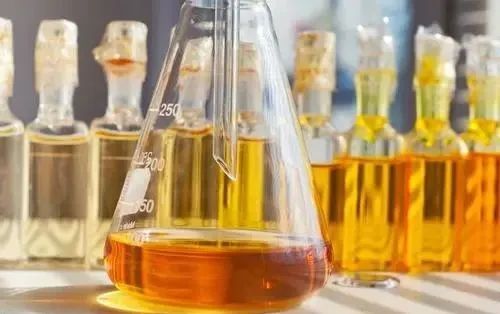With the development of hydraulic technology, the requirements for hydraulic fluids are becoming increasingly high. The performance of the Base Oil itself is far from meeting the various requirements of the hydraulic system, and it is necessary to improve the performance of the base oil by adding various additives. Currently, almost all hydraulic oils used in hydraulic systems contain various functional additives. Additives for hydraulic fluids can be roughly divided into two categories: one is additives that improve the physical properties of the oil, such as oiliness agents, anti wear agents, viscosity enhancers, anti foaming agents, and pour point depressants. Another type is additives that improve the chemical properties of the oil, such as antioxidants, rust inhibitors, mold inhibitors, demulsifiers, and metal passivators.

1. Oily additives Oil based agents are highly polar substances that can adsorb on metal surfaces at lower temperatures and pressures, forming a solid adsorption film that prevents direct contact between metals, improves oil film strength, and reduces friction and wear of metals. In hydraulic fluid, commonly used oiliness agents include oleic acid, sulfurized whale oil (T401), sulfurized cottonseed oil (T404), sulfurized olefin cottonseed oil (T405), dimeric acid (T402), etc. 2. Antiwear additives Under high friction temperatures, the decomposition products of anti-wear agents react with the metal surface, producing a compound film with low shear stress and low melting point, preventing the contact surface from biting or welding, resulting in plastic deformation, filling the uneven parts between the friction surfaces, increasing the contact surface, reducing pressure, and reducing wear. In anti-wear additives, they usually contain sulfur, phosphorus, and chlorine, and their compounds have their own characteristics. Sulfur-containing anti-wear agents, under high-temperature friction conditions, react with iron to form a sulfide iron film, which plays an anti-wear role; Phosphorus containing anti wear agents interact with steel through the products of thermal decomposition of phosphate esters at relatively low temperatures and mild friction conditions. Generate a phosphate mixture with low melting point and high plasticity, thereby playing an anti wear role; Chlorinated anti-wear agents produce a chloride iron film under extreme pressure conditions, which is a layered structure with low friction coefficient, easy shear, and good lubrication. In hydraulic fluids, commonly used anti wear agents include: zinc dialkyl dithiophosphate (T203), trimethylphenyl phosphate (T306), thiophosphate (T303), sulfurized olefins (T321), chlorinated paraffin (T301), etc. 3. Thickener Thickener is an additive that improves the viscosity temperature of hydraulic oil and increases the viscosity index. This is a type of polymer that contracts and curls into tight small balls in the oil at low temperatures, with little impact on low temperature viscosity. At high temperatures, it expands and expands in the oil, increasing viscosity and improving viscosity temperature characteristics. In hydraulic fluids, commonly used tackifiers include poly-n-butyl vinyl ether (T601), polyisobutylene (T603), Ethylene Propylene Copolymer (T611), polymethyl acrylate (KT8602), etc. 4. Antifoaming additives (defoamer) Antifoam agent is a kind of material that can reduce the stability of foam adsorption film and shorten the existence time of foam. Adding Anti Foam additives in hydraulic fluid can reduce the surface tension, so that bubbles can quickly overflow the oil surface, thus eliminating bubbles. In hydraulic fluids, commonly used anti foaming agents include dimethyl silicone oil (T901), polyester non silicone anti foaming agent (T911), metal soap, fatty acids, etc. 5. Pour Point Depressant Pour point depressants are a type of additive that can inhibit the formation of network crystals of paraffin in oil, reduce the pour point, and maintain the fluidity of the oil. This agent adsorbs or forms eutectic on the crystalline surface of paraffin, changing the crystal shape and size of paraffin, and achieving a reduction in the pour point of the oil product. In hydraulic fluids, commonly used pour point depressants include alkylnaphthalene (T801) and polymethyl methacrylate (T602B), α Olefin copolymer (M), ethylene vinyl acetate polymer (T804), etc. 6. Antioxidants Antioxidants are a type of additive that is easily oxidized and can form a complex film on the metal surface, isolating contact with oxygen and other corrosive substances, preventing the catalytic effect of metals on oil oxidation and the corrosion effect of oil on metals. Generally, the combination of several antioxidant additives has a better antioxidant effect, such as the combination of sulfides and aromatic hydrocarbons, which can produce synergistic effects; The combination of free radical terminators and peroxide decomposers also has a significant synergistic effect. In hydraulic fluids, commonly used antioxidants include 2,6-di-tert-butyl-p-cresol (T501), N-phenyl- α Naphthylamine (T531), sulfurized isobutylene (T321), dialkyl dithiocarbamate, aromatic hydrocarbons, bisphenol, etc. 7. Rust inhibitor Rust inhibitors are a type of polar compound that can form a strong hydrophilic adsorption film on metal surfaces to prevent metal rusting. In hydraulic fluids, commonly used rust inhibitors include dodecyl succinic acid (T746), barium nonylnaphthalene sulfonate (T705), and dodecyl succinate of heptadecenyl imidazoline (T703). 8. Antimold additives Anti mold additives can prevent and suppress the production of mold in emulsified oil. In hydraulic fluids, commonly used antifungal agents include phenolic compounds and formaldehyde compounds. 9. Demulsifier Demulsifiers are substances that can effectively separate or settle water and oil. In hydraulic fluids, commonly used demulsifiers include polyether polymer compounds and various polymers of ethylene oxide and propylene oxide. 10. Metal passivation additives Metal passivators are a type of additive that can protect non-ferrous metals, especially copper surface corrosion. They can also increase the oxidation resistance of oil and inhibit and passivate the corrosion of acidic substances on copper. There are two types of metal passivators used in hydraulic fluids: one is film forming passivators, which can form a composite film with copper surfaces to prevent corrosion by acids, active sulfides, and corrosive extreme pressure agents. Commonly used are benzotriazole (T706), and another type is active sulfur scavenger, which reacts with active sulfides to generate low corrosivity or non corrosiveness polysulfide compounds.

![]() May 17, 2023
May 17, 2023




